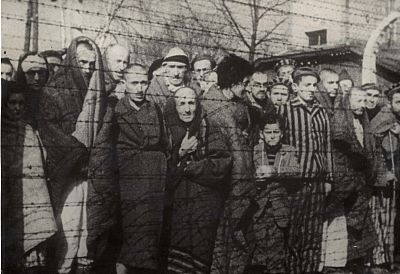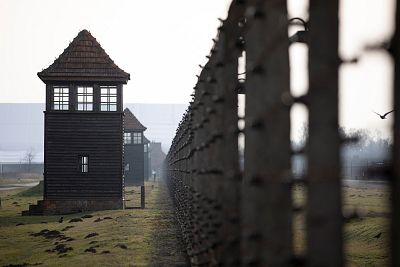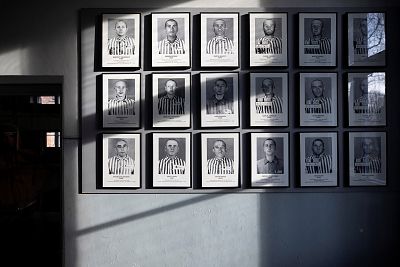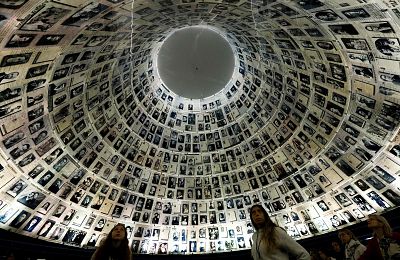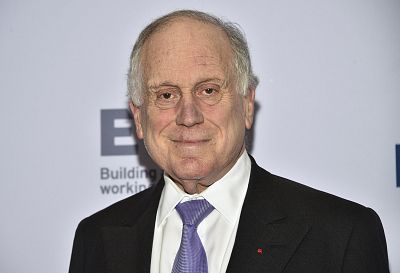"Young people are the ones that have to carry the memory of our loved ones forever," said Auschwitz survivor Sonia Klein, 94.
LONDON — The Holocaust.The word conjures up images of brutality so profound that it is hard for the mind to comprehend. After the full horror of the Nazi efforts to exterminate Europe's Jews became clear, survivors of the genocide have been persistent with their vocal refrain in humanity's ear: "Never Again."But on the eve of the 75th anniversary of the Soviet Union's liberation of the Auschwitz-Birkenau death camp in Poland, academics and Jewish groups worry that the world's collective memory is fading even as anti-Semitic attacks grow across the United States and Europe.There may not be any survivors left for the 80th anniversary because so many of them are dying, warns Ronald Lauder,the chairman of the Auschwitz-Birkenau Memorial Foundation, which helped arrange for more than 100 survivors to return to the site Monday to commemorate the day.Lauder, who is also the president of theWorld Jewish Congress and a former U.S. ambassador to Austria, said the rise in anti-Semitism in the U.S. and elsewhere feels eerily like 1930s Europe as fascism swept the continent.
 ADVERTISEMENT
ADVERTISEMENT
 ADVERTISEMENT
ADVERTISEMENT
"It's exactly the same type of thing, it's the same stuff said about Jews today as was said about Jews by the Nazis in the 1930s," he said, blaming a lack of memory of the horrors of World War II and the spread of hate speech online.According to a 2018 survey by the Conference on Jewish Material Claims Against Germany(the Claims Conference), young Americans are displaying an alarming lack of knowledge about the Holocaust.Nearly 1-in-2 millennials asked could not name a single extermination camp, where millions of Jews were systematically killed, worked to death and experimented on by Nazi doctors.Many today also underestimated the scale of the Holocaust, and 70 percent of American adults agreed that fewer people seem to care about it today than in the past, according to the Claims Conference, a New-York based group that lobbies the German government for compensation for Holocaust survivors.
In total, 6 million Jews were killed in the Holocaust, which is also known by many as the Shoah.At Auschwitz-Birkenau alone, more than a million people are estimated to have been murdered. The vast majority were Jews transported from across Europe to be killed in its gas chambers. Tens of thousands of others, including Poles, Soviet prisoners of war and those belonging to the Roma group were also killed at the site to the west of the city of Krakow.Sonia Klein, who was a teenager when she arrived at the Nazis' most notorious death camp in the spring of 1943, said the most important way to honor its liberation two years later was to ensure that as many young people as possible know what happened there."Young people are the ones that have to carry the memory of our loved ones forever," Klein, 94, said.Klein, who now lives in Brooklyn, was one of thousands of skeletal prisonersforced to walk miles in freezing conditions without proper food or clothing as the Nazis evacuated the death camp in January 1945.She survived the death march to tell the tale but it was important, she said, to remember those who didn't.To be forgotten was to be "murdered in vain," she said.
Klein was joined by historians and academics in stressing that society's understanding of the Holocaust needed to go beyond the mastering of historical facts and emphasize the values that can stop history from repeating itself."In another 10 to 15 years, we won't have almost any survivors, so we need to learn how to feed the memory of the Holocaust but also the values of fighting against this phenomena in life," said Yossi Mekelberg, a professor of international relations at Regent's University in London, whose parents moved to Israel after surviving the Holocaust."Those who play with nationalism, nativism and racism, they're playing with fire, they're playing with our lives."Amos Goldberg, a historian at the Hebrew University in Jerusalem, who focuses on the Holocaust and its memory, said there needed to be more instruction in tolerance, anti-racism, democracy, free speech and human rights."Those are the things that have to be strengthened because anti-Semitism was on the rise more or less when they started to sink," he said.
An alarming trend is that 1-in-4 Europeans harbor pernicious and pervasive attitudes toward Jews, according to a November study on anti-Semitism by the U.S.-based Anti-Defamation League.The survey found that anti-Semitic attitudes had increased in Eastern and Central Europe and that significant percentages of people in many European countries think Jews talk too much about the Holocaust.Anti-Semitic attacks worldwide rose 13 percent in 2018 from the previous year, with the highest number of incidents reported in major Western democracies including the United States, France, Britain and Germany, according to a study by Tel Aviv University.That same year, America witnessed the single deadliest attack against the Jewish community in U.S. history when 11 people were killed and seven wounded in a mass shooting at the Tree of Life synagogue in Pittsburgh. The 46-year-old accused in the shooting has pleaded not guilty to hate crimes and other offenses.Goldberg said he thought a rise in anti-Semitic attacks stemmed not from "ignorance" about the Holocaust but mainly from a rise in "ultranationalism."In this regard, he said, Israel is not blameless.
In the past decade, Israel under Prime Minister Benjamin Netanyahu has become a "major player" in an " ultranationalist illiberal alliance" of countries including Hungary under Prime Minister Viktor Orbán, the Philippines under President Rodrigo Duterte, and the U.S. under President Donald Trump, he said.In the same period, the Israeli government has been "weaponizing" the memory of the Holocaust to put a stop to criticism of its policies, including the ongoing occupation of Palestinian territory and its plans to annex parts of the occupied West Bank, he said."They are very successful … the only thing that matters now is whether those who demand their rights and criticize those violations are anti-Semitic or not," he said.Still, Goldberg was optimistic that collective memory would outlive the survivors."I don't think the witnesses are so essential for memory," he said, stressing that he did not want to dismiss their value but believed there were other ways to remember."There are many movies, recordings of many witnesses, there are school books, history books, academic scholars, novels that are still written and institutions that keep the memory like the Holocaust Memorial Museum in America," he said."It will be kept as a memory."











